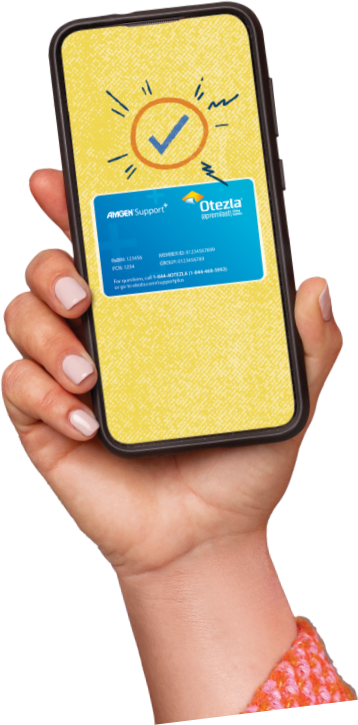Active Psoriatic Arthritis:
Active Psoriatic Arthritis:
Plaque Psoriasis:
Oral Ulcers Associated with Behçet’s Disease:

No needle. No mess.
Unlike some topicals, Otezla tackles symptoms from the inside where inflammation starts.

Did you know you may be eligible to pay as little as $0* out-of-pocket per month with the Otezla Co-Pay Program if you have commercial insurance? Your co-pay can be applied to deductible, co-insurance, and co-payment, and is available regardless of your income level.
First-time co-pay card user? Find out more.
No insurance? Learn more about accessing your Otezla prescription.
*For commercially insured patients only. Eligibility criteria and program maximums apply.
See AmgenSupportPlus.com/copay-terms for full Terms and Conditions.



For Genine, treating itchy, flaky scalp psoriasis used to mean applying greasy oils and creams each night which took away from spending time with family. When plaque psoriasis showed up on her fingernails, she and her doctor had a conversation about treating plaque psoriasis differently— from the inside-out, with a pill. With Otezla, Genine is happy to have seen clearer skin after just four months with a treatment routine that better fits her lifestyle, and helps her make time for the things she loves.
Your experiences may vary.
*Patients have been compensated for their time.
Your experiences may vary.

Rebecca was in college when she first saw plaque psoriasis appear on her face. From there, she was prescribed topical treatment after topical treatment, and their greasiness made it challenging to have a certain skincare routine or wear the clothes she wanted. Rebecca shared this with her doctor, who recommended a pill called Otezla. Rebecca is happy to have a plaque psoriasis treatment that works for her lifestyle and would encourage others to talk to their doctor sooner.
Your experiences may vary.
*Patients have been compensated for their time.
Your experiences may vary.
Do not take Otezla 30 mg tablets or Otezla XR 75 mg extended-release tablets if you are allergic to apremilast or to any of the ingredients in Otezla/Otezla XR
Otezla/Otezla XR can cause serious side effects, including:
Some medicines may make Otezla/Otezla XR less effective and should not be taken with Otezla/Otezla XR. Tell your doctor about all the medicines you take, including prescription and non-prescription medicines.
The most common side effects include diarrhea, nausea, upper respiratory tract infection, tension headache, and headache. These are not all the possible side effects with Otezla/Otezla XR. Ask your doctor about other potential side effects. Tell your doctor about any side effect that bothers you or does not go away.
Tell your doctor if you are pregnant, planning to become pregnant or planning to breastfeed.
You are encouraged to report negative side effects of prescription drugs to the FDA. Visit www.fda.gov/medwatch, or call 1-800-332-1088.
Please click here for the Full Prescribing Information for Otezla/Otezla XR.
Prescription Otezla® /Otezla XRTM (apremilast) is used for the treatment of:
Active Psoriatic Arthritis:
Plaque Psoriasis:
Oral Ulcers Associated with Behçet’s Disease:
Do not take Otezla 30 mg tablets or Otezla XR 75 mg extended-release tablets if you are allergic to apremilast or to any of the ingredients in Otezla/Otezla XR.
Otezla/Otezla XR can cause serious side effects, including: